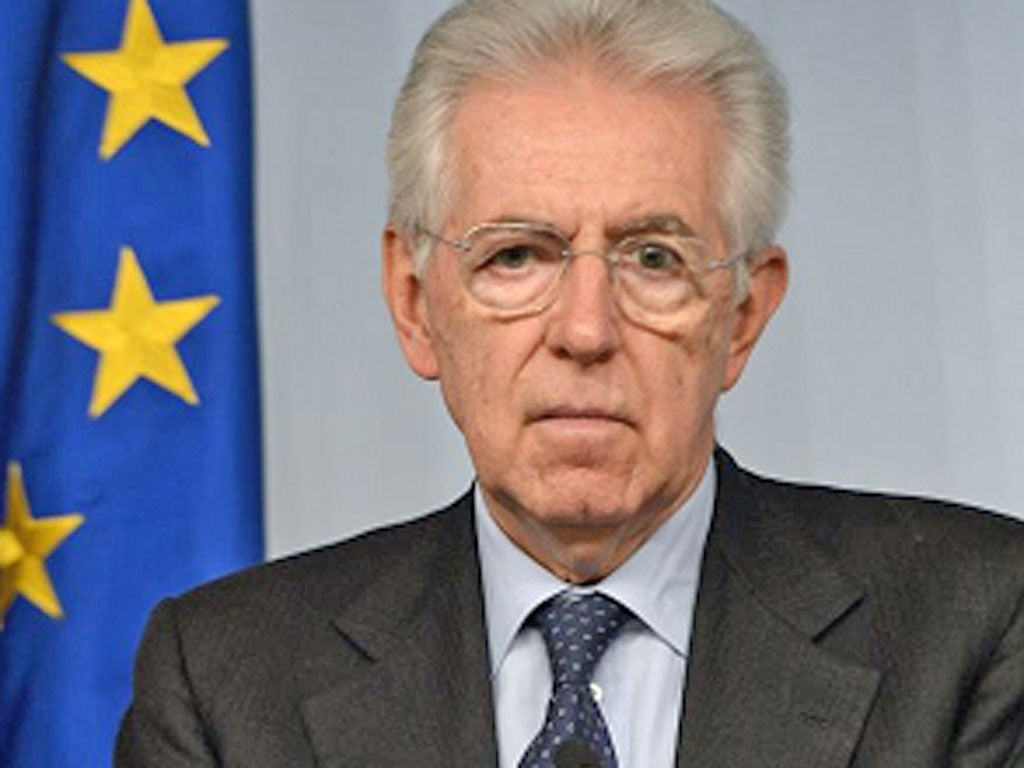Monti ready for second unelected term 'if called to'

Your support helps us to tell the story
From reproductive rights to climate change to Big Tech, The Independent is on the ground when the story is developing. Whether it's investigating the financials of Elon Musk's pro-Trump PAC or producing our latest documentary, 'The A Word', which shines a light on the American women fighting for reproductive rights, we know how important it is to parse out the facts from the messaging.
At such a critical moment in US history, we need reporters on the ground. Your donation allows us to keep sending journalists to speak to both sides of the story.
The Independent is trusted by Americans across the entire political spectrum. And unlike many other quality news outlets, we choose not to lock Americans out of our reporting and analysis with paywalls. We believe quality journalism should be available to everyone, paid for by those who can afford it.
Your support makes all the difference.Mario Monti, who resigned the Italian premiership on Friday, will not run in the February general elections, but is prepared to become an unelected prime minister for a second time in order to push his reform agenda.
The announcement from the academic and former European Commissioner came after months of speculation over his next move following a stop-gap premiership.
“I am ready to give my approval, my encouragement and, if called to, my leadership to those parties who get behind the reforms,” the 69-year-old Mr Monti said at a press conference in Rome today. He added that as a Senator for life, it was not appropriate for him to run for office.
In recent weeks Mr Monti has made it clear he believes the threatened return to power of ex-premier Silvio Berlusconi, would see Italy’s finances lurch back into the danger zone. Mr Monti was put in office in November 2011 when a series of scandals and speculators’ attacks forced Mr Berlusconi to quit.
There has already been concern at seeing an unelected official installed as Prime Minister. A second period of office for Mr Monti would likely be even more controversial. And despite earning widespread praise in Italy and beyond for his handling of the financial crisis, his ratings have recently been falling in the face of austerity measures.
Nonetheless, Mr Monti outlined an economic programme to “change Italy and reform Europe”. He said it was vital not to back track on austerity measures as this would “destroy the sacrifices that everyone has made this year” — in a clear rebuke to the populist messages coming from Mr Berlusconi.
Among the long list of reforms that were still needed, Mr Monti called for a radical overhaul of the justice system. And in a warning to the left, and particularly to Italy’s militant public sector unions, he said that changes were urgently needed to the “archaic” employment laws.
Mr Monti will be all too aware that after 13 months of relative calm under his emergency technocrat regime, which was installed with cross-party support, the national political scene is looking more volatile than ever.
He is being courted by a group of small centrist parties. Butt their share of the vote will not be enough for a parliamentary majority in the February poll
The centre-left Democratic Party, after a relatively successful six months, should, according to the opinion polls, win a majority in the lower house. Some pundits say Mr Momti could be given a key job — perhaps finance minister — in a centre-left coalition. But the redoubtable Silvio Berlusconi, although trailing in the polls, might well remain in control of the Senate, which would allow him to obstruct a centre-left regime.
Mr Berlusconi has already indicated that should he stand high office, he will play the anti-EU, anti-Germany card.
The populist, anti-establishment, Five Star Movement led by former comedian Beppe Grillo is also expected to do well – and is likely to split the anti-Berlusconi vote.
Join our commenting forum
Join thought-provoking conversations, follow other Independent readers and see their replies
Comments